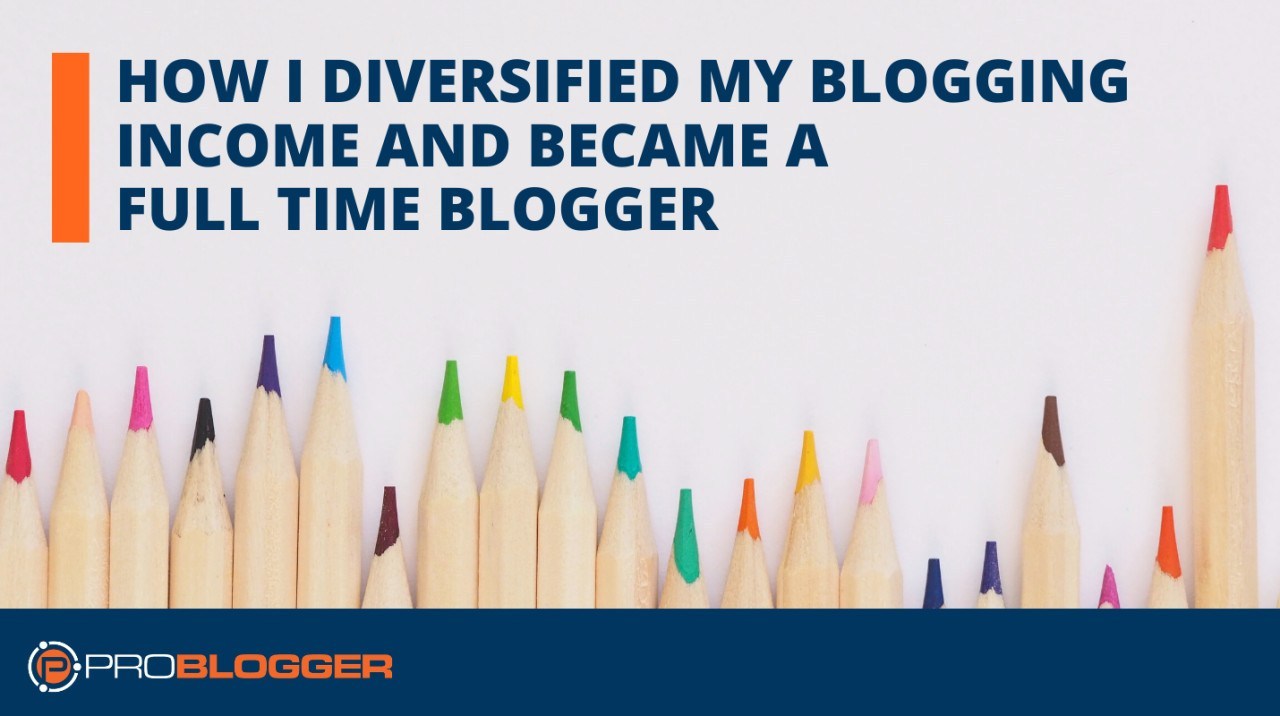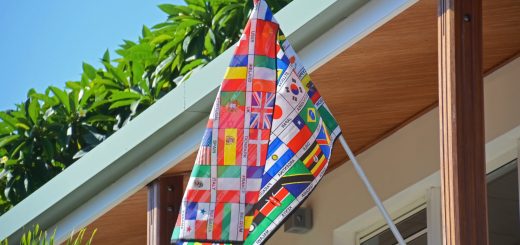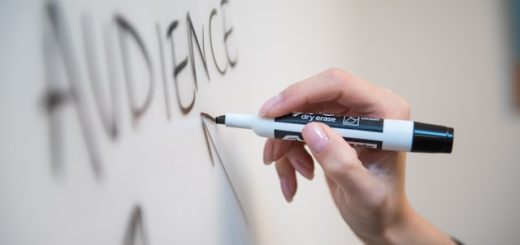How I Created My Profit Streams and Became a Full-Time Blogger

This post is based on episode 153 of the ProBlogger podcast.
Last week I talked about my profit streams – what they were, and what each one earned as a percentage of my total business profits.
In case you missed what those percentages were, here’s a summary:
- affiliate commissions – 46%
- product sales (ebooks, presets, course and printables) – 31%
- AdSense – 8%
- sponsorship – 6%
- ProBlogger job board – 5%
- ProBlogger events – 3%
- miscellaneous – 1%.
Now I can understand how all of those numbers (and the profits they represent) may seem overwhelming to a lot of you. And that worries me, because the last thing I want is for you to think you’ll never achieve numbers and that you should abandon the idea of making money as a blogger.
So this week I’m going to add some context by telling you how I created all of those profit streams. Because I didn’t create them all overnight, nor did I create them all at once. And knowing the journey I took to create them all over time may help you do the same.
Starting from scratch
I started blogging in late 2002. And in my first year I earned… nothing.
But it wasn’t a wasted year. Not at all. For me it was a foundation year where I learned a lot about the tools and the culture of blogging.
It also helped me not only improve as a writer but also build up a decent archive of content. That helped me rank in Google, which brought me a small audience. And in that same year I learned how to communicate and engage with that audience.
I also learned how to drive traffic to my site. It certainly wasn’t as much traffic as I get now, but it was a start.
In fact, that first years paved the way for a lot of what followed.
My first steps towards monetization
In my second year of blogging I began experimenting with ways to earn money from my blogs. They were costing me money, and not just from me buying domain names and hosting. They were taking up a lot of my time (by this stage I’d started a second blog where I reviewed digital cameras).
I discovered AdSense (Google’s advertising network), and started putting their ads on my blog. Back then they were quite ugly. A lot of them were text-based ads, and about all you could do in terms of customising them was change the colours. But from day one I started earning money from them – not enough to buy a coffee (it was only a few cents a day), but it was still better than nothing.
Around the same time I started experimenting with Amazon’s Affiliate Program (or the Amazon Associates Program as it’s now known). For those of you who don’t know how it works, you set up a link to an Amazon product using a special link that’s tied to you. If anyone then buys that product after using your link to find it, you get a small commission. And in my case it really was a small commission – a few cents a week. Amazon was just a bookstore back then, and I was earning 4–5% commissions on $10 books.
It may not have been a lot of money. But it was a wonderful learning experience.
Of course, I wanted to be earning a lot more than a few cents a day. So that year (and the next) I worked really hard on bringing more traffic to my sites. After all, the more people I had visiting my sites the more chance someone would click on one of ads or links. Of course, it was great to see more and more people reading my posts. But having more money coming in was also a great incentive.
Another thing I worked on was optimizing my income streams. I learned how tweaking things in AdSense (the number of ads, their sizes, their positions, etc.) could affect how much money you earned. Back then you could tweak the colours and even the design to an extent.
I also experimented with my Amazon Affiliate Links. I learned how to use calls to action to improve the chances of people buying those products. I also put those calls to action in different places on my blog to see if I could improve my chances even more.
And while all that was happening I was still creating lots of content, driving traffic, and building a community.
A more direct approach
In years four and five I added a few more income streams to my repertoire, the first being direct ad sales.
Advertisers were now starting to target my site, to the point where the same advertisers were on my site all the time. But while they bringing in revenue, I knew Google AdSense was taking a cut. So I reached out to some of them to see if they would rather work with me directly.
Again, it wasn’t a lot of money. My first direct advertiser (an Australian camera store) paid me $20 a month to advertise on my site. From there I started charging a monthly fee in return for having a specific type of ad in a specific position on my site. I charged more for banner ad in prime positions, and less for sidebar ads in a less-visible position.
Like my other income streams the money only trickled in at first. But as my traffic grew, so did my revenue.
I also experimented with other affiliate programs. Other bloggers were creating their own ebooks, and I joined some of their affiliate programs to promote their eBooks and other products (and earn a commission for each one).
This time Yahoo! had an advertising network, and I started putting their ads on my blog, along with some from Chitika. I thought I’d lose some revenue from my AdSense ads, but all that changed was me having a new income stream.
This was a lightbulb moment for me. I realized I could quickly increase my income by adding a second income stream. (It didn’t double my income overnight, but it came close.)
Product placement
Around the same time, Wiley (the US publishing house) asked me to write the ProBlogger book. Of course, that book became another small income stream. But the offer (which came completely out of the blue) only came because I’d been blogging on ProBlogger for a couple of years and had built a profile on that particular topic of blogging.
I also created a course with fellow blogger Andy Wibbels, which I ran on the ProBlogger site. The course (which I think was called Six Figure Blogging) no longer exists, but it was my first experience of having my own product to sell. And while I felt a little out of my depth at the time, I’m glad I did it.
Selling my expertise
In years six and seven I added three more income streams.
The first was being paid to speak at events. Again, this came completely out of the blue. I can still remember the first time I was asked to speak at a conference and being asked, “What’s your fee?” I thought, What? You’re going to pay me to speak at the conference? These days I say “No” more often than not (living in Australia makes it hard to get to conferences in other countries), but I still enjoy doing it.
I also tried my hand at consulting, where I would coach people about blogging. I quickly realized it wasn’t for me. I knew a lot about blogging, but I didn’t think consulting suited my style or personality. I figured I’d have a much bigger impact by creating content that lots of people could benefit from. And that led to me creating some of the products we have on ProBlogger such as the 31 Days to Build a Better Blog course.
And around this time we also created the ProBlogger job board. Again, it didn’t generate much income at first (we were only getting two or three jobs a week). But since then it has become what is probably the most passive income stream I have.
More product placement
In years seven through to ten I focused on building different types of products.
At this stage I’d started Digital Photography School, and I started putting 15–20 minutes aside each day to work on my first ebook. A lot of the content came from posts I’d written about portraiture and how to take good photos of people. After bringing all the information together, I got it edited and found someone to design the book for me.
All up it took about four months.
I was worried no-one would buy it because a lot of the information was already on the site. (I was completely upfront with my readers about this.) But we ended up selling $70,000 worth of copies in 11 days. And again, it only happened because I’d spent all these years building my audience.
I now had another income stream. And since then we’ve launched around 35 other products on a range of topics we cover on ProBlogger and Digital Photography School.
For a while we also had a membership site on ProBlogger, where people paid a monthly fee to access premium such as webinars, closed private communities, and plugins we’d developed. It was profitable enough, but it wasn’t satisfying for me to run because there wasn’t much engagement. People signed up, and I didn’t quite know why.
We closed it down, and shortly afterwards we began the ProBlogger podcast. It doesn’t make anywhere near as much money, but I feel it’s having a much greater impact. And to me, that’s more important than money.
An eventful time
It was also around this time that I ran the first ProBlogger event.
The first three or four events didn’t make a profit, which was fine because it was more a labor of love. But running events with 400 or 500 attendees can get quite expensive (and risky) to run, so I started building some income streams around them.
We also started creating ‘printables’ – products specifically designed to be printed. On Digital Photography School we created posing guides with hand drawings of different poses for taking portraits. The idea was for people to take them to a shoot so they could point to a drawing and tell their subjects, “Hey, pose like this.”
And in years 12 and 13 we created more products such courses on different aspects of photography, and Adobe Lightroom presets that people can use to process their images with one click.
Over to you
I hope this puts your mind at ease about making money from blogging. As I said, looking at all those numbers can be overwhelming. But now you know the full story of how those income streams were created, and that it happened over a dozen years or so.
You may start making money more quickly, or it may take you longer. The most important thing is to not give up. You will get there.
So where has your monetization journey taken you? What income streams are you using now, and what will you be focusing on next? Let us know in the comments.
Image credit: Plush Design Studio







